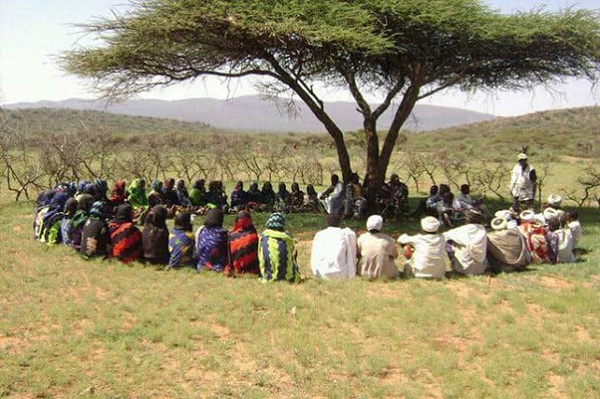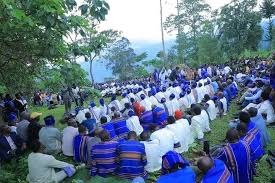
BY NAOL GIRMA
The Oromo people have a time-old system of peaceful settlement of disputes and troubleshooting justice-demanding hurdles they face with in and also with bordering regions. When there was no modern law and legal instruments of justice the system was there.
Although much attention was not given to it to consolidate it as a social development effort, it is now playing an important role in resolving social conflicts and problems. The system by which conflict and disagreement among the people of Oromo is settled and also justice is traditionally maintained and served is called Jaarsummaa.
According to Oromo culture and values, the Jaarsummaa as well as the traditions of judicial reconciliation in the Gada system are respected. Also among other ethnic groups, traditional justice systems such as ‘Yejoka, shimgelena and ye zemed dagna are practiced.
Jaarsummaa is highly respected both in Oromo culture and the Gada system. Since Jaarsummaa is not subject to change, no one can evade it. The system serves all ethnic groups with equality, truth and fairness. Being engaged in the Jaarsummaa is considered as a great honor. For one to be a candidate for Jaarsummaa she/he must be advanced in age, exemplary of maturity, conversant, and sociable.
In Jaarsummaa more than one elder participates in the process. These elders make a decision after carefully considering and listening to the arguments between the two conflicting parties. The decisions of the elders in Jaarsummaa are used to reconcile conflicting individuals or groups and to further strengthen their relationships and bonds.
A person or group who fails to implement the decisions passed by the elders will be punished by the law, ostracized, from the community. Nor will s/he be allowed to a wedding or a trip. Furthermore, he is also subject to temporary deportation. So no one can dare refuse the binding decision passed by Jaarsummaa .
If there are elders who violate the law, they will not be allowed to participate in an other session of Jaarsummaa and they will lose their trust in the eyes of people .People have the right to shun this kind of eldership. The elders have no reason to distort the law because for want of salary or any material gain.
The selection of participants in the peace-brokering elders must be neutral of either group affiliation. Since the number of potential elders is not fixed, as much elders who treat both groups across the board are chosen. Groups on each other end of the scale can voice complaint against people who want to be candidate peace-broker elders. The elders choose one among them to lead them and start looking into the matter. They take an equal number of persons from both groups and to treat the matter equally include those who do not have groups.
Elders must not distort or abuse the law for the sake of their own names and dignity. If elders abuse the law, they suffer a cold shoulder treatment t from the community. loss of social respect, eldership chance and they are neglected and do not get respect.
Therefore, elders rarely violate the standards and rituals of eldership. Nor do they claim wage. As the Oromo people know morals and respect the decisions of elders, the two conflicting parties do not refuse to accept the decisions of the elders. Elders must prove to be reputable, polite, and respectful of the jarsumma system, treat everyone equally, and act fairly and truthfully.
Approached by EPA’s journalists ,the Director of the Institute for the Study of Oromo Language, Culture and Arts at the University of the Oromia Region, Mr. Lenin Qutoo Hamado, said that jaarsummaa plays a paramount role in the Oromo culture. Jaarsummaa is =conducted by sitting in a circle in the shade of a tree. Anyone can participate in the process,;there is no strict standing on the law in the event of jaarsummaa. There are three important components to the partnership. They are: the head, the foot and the judgment.
The head comprises the parties that bring together the sides of the issue and make it public for discussion. The judge makes a decision by listening to everything the participants in the jaarsummaa say and the snow on the head.
This system is called Ilaafi ilaamee among the Maccaa and Tuulamaa, Kottu Dhufee , and the Sikkoo Mandoo. In the Oromo system of jaarsummaa, when they come to the truth and are about to be judged by the prosecutor, anyone who has a complaint or reservation about the verdict is asked.
If anyone feels that the decision is wrong, he will voice a complaint. If his complaint proves right, the elders in jaarsummaa apologize we missed the due process. If the aggrieved person has misunderstood things, they tell him exactly and explain or convince him. If the matter needs to be reviewed, they will schedule another appointment.
The other very amazing thing in Jaarsummaa of the Oromo culture is, if a judge by some chance sneezes while passing a verdict, is assumed wrong. In such a case there is a belief God has something to say. If the voice of the judge does not come out properly or if he hiccups or his tongue is tidd while speaking, he will wipe his mouth and leave the judgment. The person who lost a relative life is also reconciled by the jaarsummaa by atoning for the crime to avoid revenge( Guma).
In partnership, gumaa is not a compensation for human life. Gumaa is the reconciliation of the family, relatives and tribe of e conflict. They rebuild the hearts of conflicting people, families, or tribes through sacrifices. The main purpose of gumaa is reconciliation, not the compensation.. Lenin said.
Policies and laws issued at the federal and regional levels also encourage eldership. The elders appointed for the work of elders must be trustworthy in the community, stand for justice, independent of both parties and have no expectations of any benefit from the matter under consideration and have a good reputation and acceptance in the community for doing well. Peace-brokering Elders must treat the disputing parties equally and encourage them to come to conciliation and keep the secrets they know because of their eldership.
Both parties to the mediation must be physically present at the mediation process and should refrain from using hurtful words that could mar or hinder reconciliation. They should also provide the necessary support to resolve disputes as soon as possible. When one of the two groups expresses his or her opinion, the other should not interfere or speak without taking the right turns.
Elders should conduct the work of eldership or reconciliation insulated from any pressure and based on truth and justice. Elders must refrain from any relationship with any group in connection with the eldership matter that may undermine the independence and neutrality of the matter.
Jaarsummaan is a system by which disputes are resolved out of the formal disputes resolving mechanism .The appointed elders make the final decision, while reconciliation is a system of informal disputes where the parties come together with the support of the elders and resolve their disputes by agreement.
Settling one’s own case through eldership strengthens the relationship between the two parties that at times conflict, ensures public safety, reduces the workload of the courts, save time and expenses of the parties, and provide justice in a timely manner.
Currently, the community is using modern eldership alongside traditional eldership system to seek justice. The eldership body at any level is free from the influence of any government or other body or official. Lawyers practice their profession with complete freedom.
THE ETHIOPIAN HERALD 1 FEBRUARY 2023




